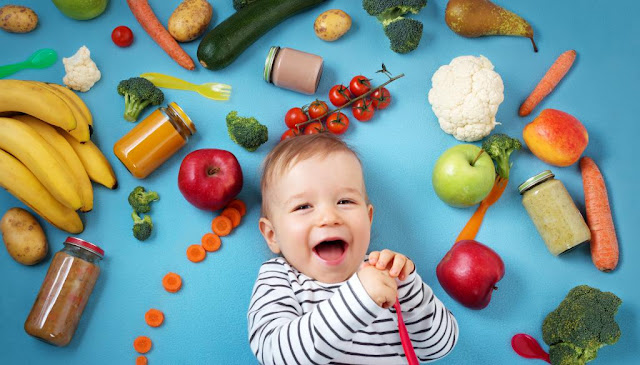Feeding Young Children
Feeding young Children
Feeding Your School-age kid is a tedious job. Do your jobs with feeding, and let your child do hers with eating. Arrange for your child to have 3 family-friendly meals a day at set times. Let her eat her way-fast or slowly, much or little, some of everything or 1 or 2 foods. Let her eat in any order, even if she eats dessert first.
Increase the number of times that the child is fed: 2–3 meals per day for infants 6–8 months of age and 3–4 meals per day for infants 9–23 months of age, with 1–2 additional snacks as required;
. It is particularly important for young children under the age of two years to have a nutritious diet to protect their immunity, and to ensure their future growth and development
Tips
- A child must sit while eating _ first in your lap and later on her own. She should not be allowed to run around the house while eating.
- Excessive milk consumption is not recommended (more than 500 ml / day). Half the amount can be given in the form of curd paneer or milk.
- Many mothers give the child just plain water when she gets up.This habit, if continued is helpful later in life. When some fluid is given at the beginning of the day so that even if she does not get enough fluid during the day, at least some of the requirement have been fulfilled. Fluid intake helpful to move their bowel.
- Dry fruits are good for children. But take precaution because some of these like dates, figs and raisins can remain struck between the teeth, leading to caries. Foods that may lead to choking in children should be avoided in those (below 3 years).i.e. peanuts, raw carrots, other nuts, popcorn, hard candies, berries and whole grapes.
- Raw eggs can cause infection and should be avoided.
- Do not bribe or threat your child to eat. You can give her 'favorite feed' after her meals.
- Children need to eat more often, breakfast, lunch, frequent dinner and snacks.
- Do not satisfy your child's appetite with only milk, fruit juices and soups. These liquids can form a part of the meal if required.
- Cooked vegetables spoil easily. They should be eaten fresh, as far as possible. If kept in refrigerator, they should be consumed within a day or two.Avoid ready made foods as far as possible. Natural freshly prepared food is preferable.
- Do not be too anxious to teach your child (who is below 3 years) table manners. As a family avoid eating food while watching television. Children who are in the habit of watching television while eating are likely to become fat because they may get so absorbed in the programme that they may eat more than what their system needs. One meal in a day should be considered 'family meal' when all members of the family eat and bond together.
- It is better to avoid controversial issues at mealtimes. Time for sharing or for discussing disturbing events can be set after dinner.
- There is no need to sterilize the utensils used for older children. Clean, dry utensils are quite safe. Drinking water should be boiled.
- Teach your child about hygiene. Hands should be washed before and after meals and the teeth brushed or rinsed after each meal.The kitchen should be free of cockroaches and flies.
- Whole wheat flour chapatis, paratha, bread or porridge are to be preferred to preparations made from refined flour. This is essential for providing our body with essential vitamins minerals and fibers. Unpolished rice is better than polished rice.
- Scrape vegetables including potatoes, instead of peeling them. Use the water in which rice or vegetable have been boiled in cooking. Do not overcook vegetables. Let the child get used to the taste of raw vegetables from a young age. In general moderate amount of spices are good for health but avoid using too much. Most children can tolerate the amount of spices used in cooking at home.
- Wholewheat flour paratha is to be preferred to white bread.
- Avoid sweets, cold drinks,sherbets, flavoring agents, tea, coffee etc. as far as possible. Approach the school authorities to send a circular to all parents not to send sweets to school for distribution on their child's birthday.
- If your non-vegetarian, remember that fish is to be preferred to other types of non-vegetarian food. Eggs should not be given daily, but on alternate days. As fish has great health benefits for kid's eyes and brain.
- Sprouted gram, moong and beans are highly nutritious. Green, orange, yellow vegetables cooked or raw are essential.
- The cheapest seasonal fruit should be offered in abundance.Many people do not realize that guavas are most nutritious than other more expensive fruits.
- Too much sugar, jaggery or salt should not be added to a young child's food. A sweet tooth attracts more dental decay and can lead to obesity.
- Children used to more salty food from an early age may continue to take more salt than desired when they grow up . This is not good for our cardio-vascular system. It is suggested that no salt be kept on dining table. If a dish does need additional salt, let it be brought from the kitchen.
- Avoid sending the child on empty stomach.














Comments
Post a Comment